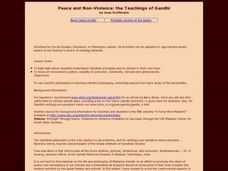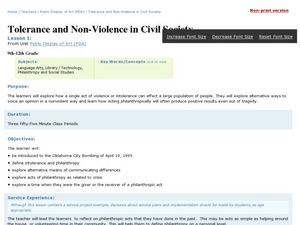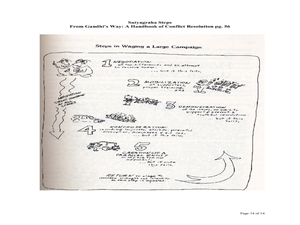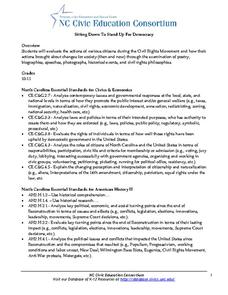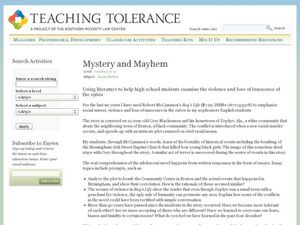Curated OER
The Student Non-Violent Coordinating Committee
High schoolers are introduced to the Student Non-Violent Coordinating Committee (SNCC), one of the "big 5" civil rights organizations (the other four were: the Urban League, NAACP, SCLC, and CORE). The SNCC is credited with having led...
Curated OER
America's Civil Rights Movement, Activity Six
Learners explore non-violence and investigate the difference between passive and active voice.
Curated OER
Music: Sing Away Your Anger
Learners learn the song, There Is Always Something You Can Do, to help them deal with anger. They brainstorm ways to resolve situations peacefully and draw pictures of themselves as peacemakers.
Curated OER
Peace and Non-Violence: the Teachings of Gandhi
Students study the Gandhian philosophy. They define certain elements such as power, beauty and discuss what they know about the struggle for independence in India. Finally students collaborate to discuss Gandhian principles to extend...
Fu Jen Catholic University
Cry Freedom
If you are considering showing the film Cry Freedom, directed by Richard Attenborough, to your class, you might show them this presentation first. The slides contain background information about South Africa, apartheid, Steve Biko, and...
Curated OER
The Power of Our Stories
Students compare violence to nonviolence. in this peace instructional activity, students tell stories from their own life that show the difference between violence and nonviolence. They listen to examples of Gandhi and Martin Luther...
Curated OER
An Introduction to the Season for Nonviolence
Fourth graders create a Venn diagram and a cause and effect graphic organizer on Gandhi and King. In this non violence lesson plan, 4th graders compare the two non violent leaders and discuss and articulate non violent protests and write...
Curated OER
Evaluating Nonviolence as a Method of Social Change
In this history worksheet, students read, describe, summarize and analyze a document concerning non-violent resistance. Students list twelve facts from evidence concerning this issue.
Curated OER
Gandhi on Poverty, Violence, and Well-Being of All
Eighth graders explore the concept of Sarvodaya. For this nonviolent resistance lesson, 8th graders listen to a lecture about Gandhi's teachings and determine how poverty is a form of violence.
Curated OER
20th Century Civil Disobedience
Young scholars write from varying perspectives in the American South about the civil rights movements in the 1950s. In this civics lesson, students view video clips and take notes. Young scholars discuss the film and listen to a lecture...
Curated OER
Protests against Bush
Non-violent conflict resolution is the focus of this lesson plan, which addresses the protests against President Bush in the UK (2003). Students list the strengths and limitations of non-violent conflict resolution, and chart the cycles...
National Endowment for the Humanities
Martin Luther King, Jr. and Nonviolent Resistance
Was nonviolent resistance the best means of securing civil rights for black Americans in the 1960s? In this highly engaging and informative lesson, your young historians will closely analyze several key documents from the civil rights...
Curated OER
Socratic Seminar on Martin Luther King, Jr.’s Letter From Birmingham Jail
Key in the struggle to gain the rights of democratic citizenship was the April 1963 arrest of Dr. Martin Luther King, Jr. for civil disobedience. To deepen their knowledge and understanding of events during the civil rights movement,...
Center for Civic Education
The Power of Nonviolence: Rosa Parks: A Quest for Equal Protection Under the Law
Teach young historians about the historical legacy of Rosa Parks with a multi-faceted lesson plan. Pupils follow stations and use journals to explore prominent events, analyze primary resource documents, and engage in interesting...
Curated OER
Tolerance and Non-Violence in Civil Society
High schoolers explore the concept of philanthropy. In this Oklahoma City bombing lesson, students submit public responses to the event in order to consider how the tragedy prompted a positive reaction. Extension activities are included.
Curated OER
Gandhi's Non-violent Revolutions: Examining Tools to Make Non-violent
Students analyze Gandhi's philosophy of nonviolent social change. In this nonviolence and social change lesson, students research a leader from the attached list who practiced nonviolent social change. Students write their own poem...
Curated OER
Martin Luther King Day
Students access a varitey of Martin Luther King, Jr. themed websites. They locate information about Dr. King and his leadership in the American civil rights movement. They take a virtual tour of his birth home and view photographic...
Curated OER
Civil Disobedience from Antigone to Hunger Games
Study the concepts and practice of civil disobedience through fiction and nonfiction texts.
University of North Carolina
Sitting Down To Stand Up For Democracy
Boycotts and bus rides, sit-ins and speeches. The focus of this amazing resource is on those people who were willing to put themselves at risk to take a stand for their belief in equal rights for all. A must-have for your curriculum...
PBS
Martin Luther King Jr.: Civil Rights Leader
Expand class members' appreciation of the work of Dr. Martin Luther King, Jr. A powerful resource examines King's speeches, writings, and actions that reveal his deep commitment to a nonviolent approach to Civil Rights. Learners watch a...
Curated OER
Our Story: Martin Luther King Jr. and Nonviolence
In this parent and child activity, young learners read Martin’s Big Words and a biography of Dr. Martin Luther King Jr. There is a wonderful guided reading pdf that defines challenge words and provides reading tips. The object of...
Curated OER
Mystery and Mayhem
Students use literature to examine the violence and loss of innocence during the 1960s. In this U.S. history instructional activity, students read Robert McCammon's Boy's Life to investigate the social unrest, violence and loss of...
Curated OER
Individual Empowerment in the Face of Oppression
Sixth graders investigate non-violent ways of dealing with conflicts by performing short plays. For this philosophy lesson, 6th graders discuss how men can gain power in a non-violent manner similar to Gandhi's actions....
Curated OER
Looking for Heroes
Students explain the importance of the 1965 Selma-to-Montgomery Voting Rights March and the long term impact in the US of non violent civic participation.
Other popular searches
- Peace and Non Violence
- Non Violence Statistics
- Gandhi, Non Violence
- Gandhi Non Violence
- Non Violence Candi
- Non Violence Gandi
- Gandhi\, Non Violence
- King Non Violence
- Gandhi\\, Non Violence
- Peace and Non Violence
- Gandhi\\\\, Non Violence
- Teach Non Violence





